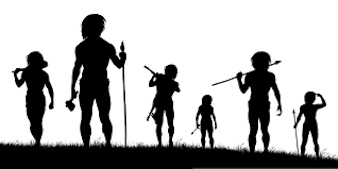For forty thousand generations, we’ve done what we believed we needed to do to ensure our own survival.
It’s been said that a society has the ethics it can afford. That may be true in some sense, but we think that we need to be very careful about defining those things we deem as necessary, versus those we’ve always done and, at least at some level, simply wish to keep on doing.
We’ve always done what we believed we needed to do to ensure our survival. Some of these we can be exceedingly grateful we’ll never have to do again, as the cruelty inherent in the process was often unavoidable. Consider, for example, a mammoth hunt by our stone age ancestors. Necessary, but even in the best case, when death or serious injury wasn’t the result for another of our tribe, there was nevertheless a great deal of suffering for a creature we now recognize as highly intelligent and social. We would be horrified to see an elephant brought down in this way today, especially given that we can now imagine a great many better ways to feed ourselves.
Nevertheless, most of us would be prepared to go pretty far as to the behavior we’ll rule acceptable when the alternative is starvation for one of our own. In a modern context, this means that we need to be able to think critically about what we’re doing. In fact, being able to distinguish between the moral and the immoral, and making a conscious choice to follow the former path, is most certainly the single most important trait that can assure our species’ survival in the 21st Century.
Beware the ‘argument from necessity’, which more often than not is an excuse to continue with activities that do more harm than good. We need to be ready to call BS when this claim of necessity is obvious nonsense. Take a case where fellow sapient beings experience extraordinary barbarity at human hands. Then, to make matters worse, consider that the community in question is among the wealthiest 10% on Earth, with a high quality of life and all the attendant benefits of that. Whether or not the activity is ‘traditional’ is very much beside the point. What you have is a case of unconscionable, morally-indefensible behavior.
The Faroe Islands’ Grindadráp is a great example.
After the shocking butchery of 1,428 white-sided dolphins in a single day in September of 2022, local anger joined the usual, to-be-expected international outrage, and the Faroese government was prompted to launch a review. Their conclusions were disappointing to say the least. And to add an element of absurdity to the whole affair, their position was shared with the world via their Ministry of Fisheries. That a dolphin, a high-order mammal with a brain as large and complex as ours, should be slaughtered under the auspices of a ‘fishery’ is an incongruity that should be evident to anyone.
We heard a lot about ‘sustainable catch limits’, the conservation status of pilot whales (the main target of the hunts), the Grind as traditional, ongoing local support, etc. All of it nonsense and completely missing the point. Bottom line – the Grindadráp hunts will continue. Compassion and animal welfare are not factors the Faroese government is prepared to consider at this time.
With a GDP per capita among the highest in the world, the case cannot be made that this is anything more than a blood sport. Yes, the animals have fed the population of this Danish autonomous territory for hundreds of years. But it’s not needed now, and the Faroese government has utterly failed to seize an opportunity to finally end the practice. Interestingly, the Prime Minister conceded that “We need to acknowledge that the world is looking at us, because our livelihood depends on the very same people.” Well, no argument there.
So we’ll continue to speak out, for as long as it takes.
For The Orca’s Voice,
Your Canadian Cetacean Alliance Team



Leave a Reply